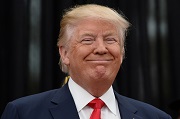|
So actually...https://en.m.wikipedia.org/wiki/Impeachment_of_Bill_Clinton posted:A resolution on rules and procedure for the trial was adopted unanimously on the following day; however, senators tabled the question of whether to call witnesses in the trial. Assuming the Wikipedia authors have worded this correctly and accurately, it means the question of calling witnesses did occur, though they ultimately decided to defer making a decision. Later... ibid posted:Over three days, February 1–3, House managers took videotaped closed-door depositions from Monica Lewinsky, Clinton's friend Vernon Jordan, and White House aide Sidney Blumenthal. On February 4, however, the Senate voted 70–30 that excerpting these videotapes would suffice as testimony, rather than calling live witnesses to appear at trial. After they start without even considering the question of witnesses, they'll come back afterwards and say that the Clinton trial didn't have any witness testimony anyway so none is needed here. (I'm gonna try to track down what discussion on the question occurred before they tabled)
|
|
|
|

|
| # ? Jun 4, 2024 15:05 |
|
Fritz Coldcockin posted:She had two bad choices--vote to convict and lose a primary, or vote to acquit, MAYBE survive a primary and lose a general. She chose option B. If she chose option A, she'd lose that 7 figure parachute no-show job she was promised.
|
|
|
|
https://twitter.com/kyledcheney/status/1215676384242216960 finally, actual movement
|
|
|
|
|
Fritz Coldcockin posted:Not sure that's gonna be an option, and the closer Mitch pushes this to the election the more dangerous it gets for them. Gotta get through primaries first.
|
|
|
|
eke out posted:https://twitter.com/kyledcheney/status/1215676384242216960 WITCH HUNT!
|
|
|
|
F_Shit_Fitzgerald posted:That makes sense. He has to know how it would look to just go ahead with a trial on a purely GOP vote. I doubt the Turtle cares. They've made it clear, rules don't matter where he has power.
|
|
|
|
Tibalt posted:I doubt that something sufficient would appear between the acquittal and the election, Do you mean something like assassinating a foreign governments military commander and falsifying justification to get re-elected? (Yes not after acquittal but still)
|
|
|
|
mitztronic posted:Do you mean something like assassinating a foreign governments military commander and falsifying justification to get re-elected? (Yes not after acquittal but still) Look at the motivation of the Republican party. Someone in a foreign nation who was not lighter than a paper bag getting killed is not going to suddenly cause problems on the domestic front for a Republican. Half those loving bigots would have a party if he no-poo poo did use a nuclear weapon on Iran.
|
|
|
|
https://twitter.com/gtconway3d/status/1215798267558141952?s=19 Good thread. I like this strategy. Can't think of a reason not to do it this way.
|
|
|
|
So here's an interesting little tidbit from the Wall Street Journal suggesting that by pushing Trump into the arms of the Senate Republicans the impeachment proceedings ]may have been the primary motivation for killing assassinating Soleimani.The Wall Street Journal posted:The way the strike was handled has drawn scrutiny from Democrats and some Republicans. Critics say the decision was hasty, considering the risk of all-out war. They also question whether the intelligence that prompted the action was as clear-cut and alarming as the White House has said, and see the move as doing little to further U.S. interests in the region. Perhaps it's worth noting here that Bill Clinton was gearing up to privatize Social Security and shift it onto the stock market in his second term and was forced to back away from the issue after impeachment, which compelled him to double down on support from the traditional Democratic constituencies who were most opposed to social security. The result was that the Republicans actually helped give the Democratic base more leverage over the President and thus stopped him from breaking ranks with elements of his own party. Ironically enough, impeaching Trump could end up compelling him to pursue more traditional Republican priorities because it gives the party leverage over him that it previously lacked.
|
|
|
|
The Supreme Court can review an unfair impeachment trial washingtonpost.com/January 10, 2020 'If Senate Majority Leader Mitch McConnell follows through on his desire to hold an abbreviated impeachment trial without witnesses — as many in his party would prefer — he will be testing the limits of the impeachment trial clause of the Constitution. Minority Leader Charles E. Schumer has declared that a trial without witnesses (or perhaps even any documents) would amount to “a coverup.” Worries about a rubber-stamp trial are one reason House Speaker Nancy Pelosi has delayed submitting the articles of impeachment. If such a sham trial comes to pass, is there any remedy? In fact, there is a stronger case than many think that the Supreme Court has the power to review impeachment trials, to ensure that Senate procedures meet a basic level of fairness. The only Supreme Court decision addressing the Senate impeachment trial clause is Nixon v. United States (1993) — which has nothing to do with Richard Nixon. When Walter L. Nixon, a federal judge in Mississippi, was impeached in 1989 and removed from office, he sued the United States, the secretary of state and the Administrative Office of the U.S. Courts, arguing that the Senate had not conducted a proper “trial” as required by the Constitution. The court, with Chief Justice William Rehnquist writing for the majority, ruled against him. It concluded that how the Senate conducted impeachment trials was essentially a political question, because the Constitution gives that body the “sole power” to try impeached officials. That meant the dispute was, in the legal jargon, “nonjusticiable.” But other justices — namely Byron White, Harry Blackmun and David Souter — argued that, while Nixon deserved to lose, it was possible that one day the Senate would conduct such an unfair impeachment trial that the courts would be obliged to hear a case if an aggrieved party sought a judicial remedy. That’s precisely the situation we may face today. ( and /The Washington Post) In the events that led to his impeachment, Nixon was convicted of crimes (two counts of making false statements to a grand jury, related to an attempt to interfere in the investigation of a friend’s son) and sentenced to prison. But he refused to resign and continued to collect his judicial salary behind bars. The House therefore impeached Nixon and sent articles to the Senate to conduct a trial. Under rules established by the Senate to handle impeachments, Nixon’s case was referred to a committee of senators to “receive evidence and take testimony.” After four days of hearings and 10 witnesses, the committee presented the full Senate with a transcript of its proceedings and a report. The House managers and Nixon submitted briefs to the full Senate; after oral arguments from the Senate floor, a personal appeal from Nixon and questions from several senators, the full Senate voted to remove him from office. He appealed, claiming that the Senate had not really “tried” him: Delegating so much work to a small committee was a shirking of its duty, he argued, and not what the founders had intended. The Supreme Court’s vote against Nixon was 9 to 0. But White and Souter filed concurring opinions (Blackmun joined White’s) that contemporary courts might draw on, should the Senate vote, after a trial that’s clearly perfunctory, to keep Trump in office. As the court noted in Nixon, the Constitution lays out several indispensable elements of an impeachment trial: The Senate “shall be on Oath or Affirmation”; if it’s the president who’s on trial, “the Chief Justice shall preside”; and conviction requires a two-thirds majority of the members present. Beyond this, the terms of how the Senate tries an impeachment are left to its discretion. But there are surely limits, White, Blackmun and Souter argued. What if the trial were manifestly bogus? The issue had come up in the oral argument for the case. White asked the solicitor general (Kenneth Starr, as it happens) if, after the House sent over articles of impeachment, the Senate could, “without any procedure whatsoever,” unanimously find the accused guilty on the grounds that he was “a bad guy.” The government replied that, yes, the Senate indeed had that latitude. That answer troubled several justices. While conceding that it was “extremely unlikely that the Senate would abuse its discretion and insist on a procedure that could not be deemed a trial by reasonable judges,” White wrote, the scenario was hardly unimaginable — and would provide grounds for judicial review. “Were the Senate, for example, to adopt the practice of automatically entering a judgment of conviction whenever articles of impeachment were delivered from the House it is quite clear that the Senate will have failed to ‘try’ impeachments,” White wrote If the Senate were to convict “upon a coin-toss,” Justice Souter added, “or upon a summary determination that an officer of the United States was simply ‘a bad guy,’ judicial interference might well be appropriate.” “In such circumstances,” he wrote, “the Senate’s action might be so far beyond the scope of its constitutional authority, and the consequent impact on the Republic so great, as to merit a judicial response despite the prudential concerns that would ordinarily counsel silence.” Impeachment is the law. Saying ‘political process’ only helps Trump’s narrative. McConnell has said he does not intend to be impartial — and in fact will work, lockstep, with the White House during the trial. That would violate his oath to “do impartial justice according to the Constitution and laws.” If he dispenses with witnesses and speedily steers the outcome to the one desired by the White House, that would reduce the Senate proceeding to the kind of “summary determination” that the three justices warned about. Collectively, such actions could be seen by reasonable judges as “seriously threatening the integrity of the results” — the standard Souter suggested should trigger judicial review. Since the Constitution grants the chief justice the privilege of presiding over the trial, he ought to have — and in my view does have, under proper constitutional interpretation — considerable power to steer the Senate toward reasonable standards for weighing evidence and rendering judgments. He cannot and should not be a potted plant. The current Senate rules, however, reduce the chief justice’s role to one of subservience and ceremony; even his rulings on admissibility of evidence can be overridden by the Senate. That cannot possibly be what the founders intended. Yes, the founders provided that the House would have “sole power” over impeachments and the Senate “sole power” over trials of impeachment. But the Constitution also grants “all legislative powers” to the House and Senate, and still the Supreme Court exercises routine judicial review over laws. If McConnell and his Republican colleagues insist on setting rules that turn the trial into a farce, then the matter would be ripe for judicial review, as outlined by the various justices in Nixon v. United States. The House — through the speaker or the impeachment managers — could take the matter to court.
|
|
|
|
Otteration posted:The Supreme Court can review an unfair impeachment trial The Opening Arguments podcast had an ep in late December that did a dive into the Nixon case, for anyone who wanted more The gist ends up being "it's all on John Robert's shoulders" if I remember correctly.
|
|
|
|
Pander posted:The Opening Arguments podcast had an ep in late December that did a dive into the Nixon case, for anyone who wanted more I mean, in a 5-4 decision is why its probably not worth it getting your hopes up, but I still think just the act of dragging it out through the Supreme Court keeps the odiousness of it in the public's eye longer which is likely to be bad for Trump.
|
|
|
|
Also from OA but the one hope here is that a trial actually starts and John Roberts presides and has enough shame to recuse himself. Then you get a 4-4 decision and provided it's first brought before the DC circuit, their decision would stand. Considering it's one of the most liberal circuits that is pretty much the only path to a legal intervention. If the senate doesn't actually being anything to trial though, John Roberts likely won't recuse and it'll be 5-4 all the way to Mar a Lago.
|
|
|
|
DandyLion posted:I mean, in a 5-4 decision is why its probably not worth it getting your hopes up, but I still think just the act of dragging it out through the Supreme Court keeps the odiousness of it in the public's eye longer which is likely to be bad for Trump. There's definitely lines that Roberts and the not totally insane ideologue justices won't cross. There's zero chance that they say that the president and administration officials can ignore subpoenas or are free to cover up their criminal activity, for example. But at the same time, they're also not going to step in when the Senate wipes their rear end with the articles of impeachment. As long as McConnell does the absolute bare minimum required by the constitution for an impeachment trial they're not going to lift a finger.
|
|
|
|
Doesn't Roberts have one of the most conservative voting records of the sitting Justices? Even if he was a "reasonable conservative" the Supreme Court seat is an insanely powerful position and power can do poo poo to people, especially when it seems to everyone that the right is closing ranks on us. Conservatives are generally not reasonable when it comes to politics, and there is no way I would count on a conservative in power to do the right thing even some of the time which I feel pretty confident about seeing as how most elected Republican officials have acted since Trump won the election. Can someone tell me what evidence there is that he won't somehow be extremely partisan when it comes to it? I feel like if he had more loyalty to the impartiality of the court or respect for the court he would not be as biased as he is in the first place.
|
|
|
|
Strange Poon posted:Doesn't Roberts have one of the most conservative voting records of the sitting Justices? Even if he was a "reasonable conservative" the Supreme Court seat is an insanely powerful position and power can do poo poo to people, especially when it seems to everyone that the right is closing ranks on us. Conservatives are generally not reasonable when it comes to politics, and there is no way I would count on a conservative in power to do the right thing even some of the time which I feel pretty confident about seeing as how most elected Republican officials have acted since Trump won the election. You could say voting the other way on Dept. Of Commerce v. NY (citizenship question) was him avoiding being nakedly partisan.
|
|
|
|
El Nam posted:You could say voting the other way on Dept. Of Commerce v. NY (citizenship question) was him avoiding being nakedly partisan. He also saved the Affordable Care Act. As ridiculous as it seems, he is the current swing vote on the court. The other four conservative justices are generally farther to the right than he, though Goursch is to his left in some cases.
|
|
|
|
It's also going to be very easy for him to say that any Senate trial, or even a dismissal, is a political question and that there isn't a judicial remedy for impeachment. Letting the Nixon precedent stand seems both the safe, reasonable, and conservative route to go.
|
|
|
|
Yeah, wasn’t gerrymandering deemed a political issue that the courts wouldn’t do anything about? This would probably be similar.
|
|
|
|
Strange Poon posted:Doesn't Roberts have one of the most conservative voting records of the sitting Justices? Even if he was a "reasonable conservative" the Supreme Court seat is an insanely powerful position and power can do poo poo to people, especially when it seems to everyone that the right is closing ranks on us. Conservatives are generally not reasonable when it comes to politics, and there is no way I would count on a conservative in power to do the right thing even some of the time which I feel pretty confident about seeing as how most elected Republican officials have acted since Trump won the election. The answer lies in the question: Roberts "doing the right thing" happens to also include Roberts solidifying his own power as Chief Justice. To go to bat for Trump et al. for ignoring subpoenas is to neuter himself and his position. He'll do everything in his power to keep it from coming to a decision, mind you, but if it comes down to it I trust Roberts will look out for #1.
|
|
|
|
Random Stranger posted:There's definitely lines that Roberts and the not totally insane ideologue justices won't cross. There's zero chance that they say that the president and administration officials can ignore subpoenas or are free to cover up their criminal activity, for example. But at the same time, they're also not going to step in when the Senate wipes their rear end with the articles of impeachment. As long as McConnell does the absolute bare minimum required by the constitution for an impeachment trial they're not going to lift a finger. Why do you think that? There's nothing stopping them from ruling that Republicans may ignore subpoena's whereas Democrats must be punished for the same thing as long as they hold the majority (which they will for the next 20 years at least).
|
|
|
|
I'm genuinely unsure whether Roberts is motivated primarily by individual power seeking. Not saying it's not there, just don't know whether it's in the driver's seat or the back seat yelling instructions. Never missing a chance to rule against representational democracy in favor of stacking the deck for minority authoritarian regimes doesn't feel like personal power seeking behavior.
|
|
|
|
https://twitter.com/CBSEveningNews/status/1216830524385386498
|
|
|
|
|

|
|
|
|
Those "witnesses" will be Hunter and Joe Biden, the whistleblower, Robert Mueller, George Soros, and every other Republican boogeyman they can think of.
|
|
|
|
BigBallChunkyTime posted:Those "witnesses" will be Hunter and Joe Biden, the whistleblower, Robert Mueller, George Soros, and every other Republican boogeyman they can think of. Without this vote going in the "yes" direction nobody on either side of the aisle can call any witnesses so Democrats can't get any new testimony. Republicans voting to allow witnesses is a good thing in this case. Granted you're not wrong that Republicans will try to call all of those people and Adam Schiff in order to waste our time
|
|
|
|
https://twitter.com/kylegriffin1/status/1216837340422967304
|
|
|
|
Angry_Ed posted:Without this vote going in the "yes" direction nobody on either side of the aisle can call any witnesses so Democrats can't get any new testimony. Republicans voting to allow witnesses is a good thing in this case. Granted you're not wrong that Republicans will try to call all of those people and Adam Schiff in order to waste our time In a way I'm fine with the Republicans calling a bunch nonsensical witnesses, because they'll have nothing pertinent to say in their testimony. Adam Schiff in exchange for John Bolton is a pretty good trade.
|
|
|
|
Deteriorata posted:In a way I'm fine with the Republicans calling a bunch nonsensical witnesses, because they'll have nothing pertinent to say in their testimony. Adam Schiff in exchange for John Bolton is a pretty good trade. Bolton can totally about face (from his earlier opinions) in his testimony because he's not at risk of perjuring himself.
|
|
|
|
trumps not even sure what he wants. part of him wants a big dumb cicus that blows him and part of him wants the senate to just ignore it.
|
|
|
Deteriorata posted:Adam Schiff in exchange for John Bolton is a pretty good trade. quote:and for any Speech or Debate in either House, they shall not be questioned in any other Place. (i agree that worries about nonsense witnesses are overblown though) eke out fucked around with this message at 23:00 on Jan 13, 2020 |
|
|
|
|
Charlz Guybon posted:He also saved the Affordable Care Act. Thomas is occasionally to his left because Thomas is completely insane in a way that doesn't always map to modern conservatism.
|
|
|
|
DandyLion posted:Bolton can totally about face (from his earlier opinions) in his testimony because he's not at risk of perjuring himself. Wait, what? Does that mean witnesses in the Senate trial wouldn't be under oath? Or are you just saying that since he hasn't testified under oath yet, he has more leeway to say whatever he wants? (I imagine he's constrained by what others have already said under oath, though.)
|
|
|
|
BigBallChunkyTime posted:Those "witnesses" will be Hunter and Joe Biden, the whistleblower, Robert Mueller, George Soros, and every other Republican boogeyman they can think of. Don't forget Hillary Clinton, just because her emails need another once over.
|
|
|
|
Practically speaking, would anyone pro-Republican need to worry about perjury at all? Republicans have a majority so how would perjury charges be enforced against anyone on their team? That majority isn't going to vote to enforce consequences on their own team, their rabid voting base would tear them apart the instant Strong Daddy twitter-shits about not being loyal.
|
|
|
|
https://twitter.com/alexanderbolton/status/1216857658629808128?s=20
|
|
|
|
Zarin posted:Wait, what? Does that mean witnesses in the Senate trial wouldn't be under oath? Yeah the latter
|
|
|
bird food bathtub posted:Practically speaking, would anyone pro-Republican need to worry about perjury at all? Republicans have a majority so how would perjury charges be enforced against anyone on their team? That majority isn't going to vote to enforce consequences on their own team, their rabid voting base would tear them apart the instant Strong Daddy twitter-shits about not being loyal. given there's better than even odds a different party controls the DOJ roughly 370 days from now, I don't think any of these people are stupid enough to think "I'll just lie about everything and it'll be fine" is an acceptable low-risk option
|
|
|
|
|

|
| # ? Jun 4, 2024 15:05 |
|
This isn't how it works though is it? You either vote to hear from witnesses or not, you don't get to cherry pick who because that's up to each side once the rules are agreed to.
|
|
|














































